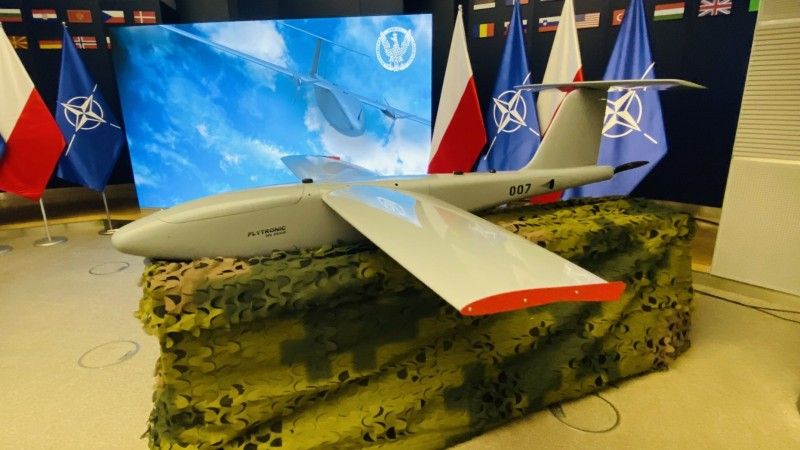Land Forces
Gladius: Polish Procurement of UCAVs with a Strike Range of 100 kilometers

The Head of the Polish MoD approved the procurement of Gladius battery fire modules. The name refers to the strike/reconnaissance system that is composed of the latest WB Group UAVs - FT-5 reconnaissance UAS and armed BSP-U platform, where the U letter stands for „strike”. All elements are integrated within the Topaz network, already being used by the Polish artillery units.
Head of the Polish Ministry of Defence, Mariusz Błaszczak did confirm that the first elements of the Gladius Modules would be delivered by the end of this year, to artillery regiments stationed in the east. He added that the Ministry is consequently making steps towards the reinforcement of the Polish Armed Forces through procurements as such - this is relevant within the context of the War in Ukraine. Several hundred UAVs are expected to be delivered, including reconnaissance FT-5 platforms and BSP-U Gladius systems. The claim above seems to be aligned with the procurement value - PLN 2 bn (approx. USD 450 million).
The value has a total value of PLN 2 bn. gross, while the first deliveries of the Gladius system belonging to the battery module would be finalized as early as 2022. This translates into the biggest ever UAS contract in history, involving the Polish Armed Forces. The amount is higher than the one associated with the procurement of Bayraktar TB2s (USD 270 million), or the Orlik program UAVs (still undelivered, at a price tag of PLN 800 million).
Not only is Gladius a sword. It also includes the eyes, ears, and brain. This is a system expected to be based on existing, functioning solutions, and it is to be developed, by Polish businesses, employing Polish engineers.
@ President of the Management Board at the WB Group
According to the information released by the Armament Agency: Gladius battery search and strike systems modules would be destined for conducting precise strikes against targets at a range of 100 kilometers and to collect aerial IMINT with the use of reconnaissance UAVs of the FT-5 family, equipped with optronic sensors allowing them to record imagery in daylight and with the use of the IR spectrum. Gladius UCAVs integrated with the Topaz fire control system used by the Polish Armed Forces would be acting as the effectors. The battery module would include launchers, command vehicles, ammunition/technical support carriers, and a stock of Gladius UCAVs.
The agreement concerns the delivery of 4 strike/search UAV battery modules named Gladius, along with a training and logistics package, to meet the requirements of the Rocket and Artillery Component of the Polish Armed Forces. The logistics package includes delivery of maintenance kits and servicing for UAVs, while the training package shall take into account personnel training, training UAVs, and Gladius search and strike system simulators.
As Minister Skurkiewicz announced back in 2020, the Gladius program was created to improve the Polish Armed Forces' reconnaissance capabilities, and the capability to strike targets at distances greater, than offered by the short-range FlyEye UAV". The search and strike systems are to be received by the land artillery elements.

Gladius systems would be used by the land forces' artillery regiments operating artillery systems and reconnaissance systems (such as the Liwiec firefinder radars), integrated with the use of the Topaz network. FT-5 short-range tactical UAVs developed by the WB Group, and perfected for a few years now, would be acting as a reconnaissance asset. BSP-U UAVs would be acting as the effector, with the release mentioning 100 kilometers as the range of the system. It remains unclear what the BSP-U is going to be - but, as we have found out, this designation does not refer to loitering munitions. This suggests that BSP-U would come in a form of an armed UAV, or an effector that is simpler in operation than loitering munitions - being launched after the FT-5 UAV designates the target, and immediately striking it afterward, without an ability to loiter and search. The term "effector" used by the MoD, referring to BSP-U, shows that the latter solution might be the case. The effector that would be simpler in design would also be cheaper, hence the possibility to order it in major quantities.
This would be the first system with that range, that would remain at disposal of the Polish Rocket and Artillery Forces - since the moment when the tactical missiles have been decommissioned. It is also going to be the first-ever time when a single system fuses long-range with precision-strike capability. The introduction of the Gladius system would have a direct impact on the significant enhancement of the capabilities available to the Polish military's Rocket and Artillery Forces. So far, the artillery units have been able to attack targets at a distance of a little over 40 kilometers, with the use of Krab howitzers, and 122 mm Feniks rockets integrated into the WR-40 Langusta MLRS.
